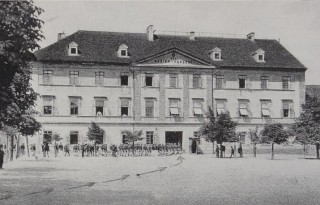
Mariánská kasárna in CB (Budweis). Until 1 June 1915 it was the home of the Good Soldier Švejk's Infanterieregiment Nr. 91. In 1915 Jaroslav Hašek also served with the regiment in these barracks.
The novel The Good Soldier Švejk refers to a number of institutions and firms, public as well as private. On these pages they were until 15 September 2013 categorised as 'Places'. This only partly makes sense as this type of entity can not always be associated with fixed geographical points, in the way that for instance cities, mountains and rivers can. This new page contains military and civilian institutions (including army units, regiments etc.), organisations, hotels, public houses, newspapers and magazines.
The line between this page and "Places" is blurred, churches do for instance rarely change location, but are still included here. Therefore Prague and Vienna will still be found in the "Places" database, because these have constant coordinates. On the other hand institutions may change location: Odvodní komise and Bendlovka are not unequivocal geographical terms so they will from now on appear on this page.
The names are colour coded according to their role in the plot, illustrated by these examples: U kalicha as a location where the plot takes place, k.u.k. Kriegsministerium mentioned in the narrative, Pražské úřední listy as part of a dialogue, and Stoletá kavárna, mentioned in an anecdote.
 Institutions index of institutions, taverns, military units, societies, periodicals ... (288)
Show all
Institutions index of institutions, taverns, military units, societies, periodicals ... (288)
Show all I. In the rear
I. In the rear  14. Švejk as military servant to senior lieutenant Lukáš (14)
14. Švejk as military servant to senior lieutenant Lukáš (14) II. At the front
II. At the front  1. Švejk's mishaps on the train (15)
1. Švejk's mishaps on the train (15) 2. Švejk's budějovická anabasis (38)
2. Švejk's budějovická anabasis (38) 3. Švejk's happenings in Királyhida (44)
3. Švejk's happenings in Királyhida (44) 4. New afflictions (26)
4. New afflictions (26)



|
I. In the rear |
 | |
6. Švejk at home again, having broken through the vicious circle | |||
 | Kostel svatého Apolináře |  | ||||
| Praha II./443, Apolinářská 20 | ||||||
| ||||||
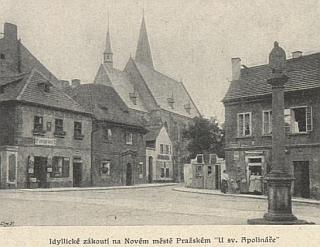
, 10.9.1911

Kostel svatého Apolináře is mentioned in the narrative because the servant from church was at U kalicha when Švejk dropped by the pub after his final release from c.k. policejní ředitelství. This was probably on 29 July 1914 because Austria-Hungary had just declared war on Serbia.
Background
Kostel svatého Apolináře (Church of Saint Apollinaire) is a church in Nové město which is located only a few hundred meters from U kalicha. It was built in the 15th century and named after Apollinaris of Ravenna.
Quote(s) from the novel
[I.6] Ve výčepu panovalo hrobové ticho. Sedělo tam několik hostů, mezi nimi kostelník od sv. Apolináře.
Also written:Church of Saint ApollinaireenApollinarkirchede
Literature
 | Volná myšlenka |  | ||||
| Královské Vinohrady/588, Korunní tř. 6 | ||||||
| ||||||
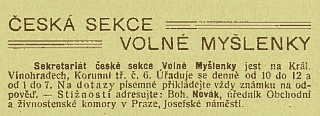
Věstník volné myšlenky, 1910
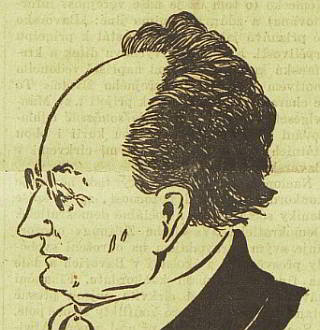
Karel Pelant
,1.2.1925
Volná myšlenka is mentioned in when pubkeeper Palivec cries out in court: "Long live Free thought!". This is what Mrs. Palivcová tells Švejk when he returns to U kalicha after having been released at the time war broke out.
Background
Volná myšlenka was an association of freethinkers, an anticlerical an atheist movement that appeared in many countries in the 19th century. The best known freethinker internationally was Francesc Ferrer i Guàrdia (1859-1909).
The Czech organisation was founded in 1904, and provisionally dissolved in 1915. The best known representative of the Czech organisation was Machar, chairman from 1909. The organization also published a monthly periodical of the same name. Their most immediate goal was separation of state and church.
Karel Pelant (1874 - 1925) was one of the founders of the Czech section and this was a person Hašek knew well. Zdeněk Matěj Kuděj describes a meeting between the two in Plzeň in 1913 that was arranged after Pelant, at the time editor of the weekly Směr, owed Hašek money for a few stories he had written.
Pelant also appears in Strana mírného pokroku v mezích zákona and is listed as publishers of the Freethinker's monthly.
Quote(s) from the novel
[I.6] Já jsem se tak lekla toho příbuzenského poměru, aby snad ještě z toho něco nebylo, tak jsem se vzdala svědectví a on chudák stará se tak na mne podíval, do smrti na ty jeho oči nezapomenu. A potom, po rozsudku, když ho odváděli, vykřik jim tam na chodbě, jak byl z toho cele] pitomej: ,Ať žije Volná myšlenka!`
Literature
 | Mimosa |  | ||||
| Praha I./496, Havelská ul. 31 | ||||||
| ||||||
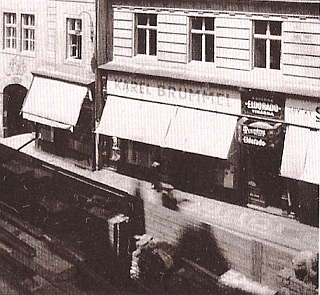
20.7.1936 • Celkový pohled na dům čp. 496 na Starém Městě v Havelské ulici z výšky.
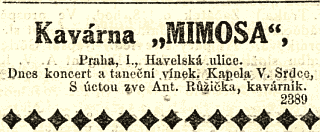
,27.2.1913

,29.3.1913
Mimosa is mentioned because the doorman who had occupied Švejk's room worked here.
Background
Mimosa was a night café in Staré město that doesn't exist any more. In the address book of 1910 another café is listed at number 496/31: U Hvězdičky tři zlaté.
From february 1913 adverts reveal that Mimosa now was established on the premises[a]. The owner was Antonín Růžicka and on offer was live music, dancing, entertainment, food and Pilsner Urquell on tap. The establishment also advertised around-the-clock opening hours[b].
In February 1917 Čech reported that the establishment had been forced to close down on demand from the police[c]. In 1936, just before the building was demolished, a café Eldorado existed on the former premises of Mimosa.
Quote(s) from the novel
[I.6] Když si bral límeček a skládal kravatu, vzpamatoval se již do té míry, že mohl ujistit Švejka, že noční kavárna „Mimosa“ jest opravdu jedna z nejslušnějších nočních místností, kam mají přístup jedině dámy, které mají policejní knížku v úplném pořádku, a zval Švejka srdečně, aby přišel na návštěvu.
Credit: Jaroslav Šerák
Literature
- Kavárna "Mimosa", ,27.2.1913 [a]
- Mimosa, ,29.3.1913 [b]
- Kavárna a vinárna "Mimosa", ,2.5.1913
- Luftig auf Vaters Kosten, ,7.11.1913
- Z ovzduší hostinské živnosti, ,18.2.1917 [c]
| a | Kavárna "Mimosa" | 27.2.1913 | |
| b | Mimosa | 29.3.1913 | |
| c | Z ovzduší hostinské živnosti | 18.2.1917 |



|
I. In the rear |
 | |
6. Švejk at home again, having broken through the vicious circle | |||
| © 2008 - 2024 Jomar Hønsi | Last updated: 20.11.2024 |


